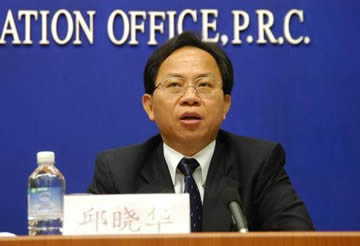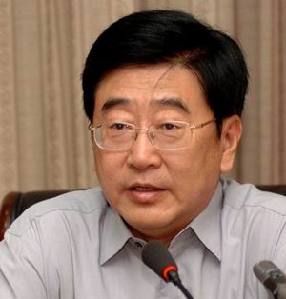Since September, several high-level officials accountable for the milk powder scandal and a dam burst in Xiangfen, Shanxi Province have resigned or been sacked. However, public attention is increasingly focused on the questions of when and how such officials might be reinstated.
On August 28, an article entitled Policy Suggestions on Controlling the Current Economic Situation aroused public attention online. The author – Qiu Xiaohua, former director of the National Bureau of Statistics – was making a public appearance for the first time since he was expelled from the Party. He was reinstated as a Senior Research Fellow in China National Offshore Oil Corp.
 |
|
Qiu Xiaohua |
Qiu had taken bribes from businessmen, led a "dissolute life" that couldn't be supported by his regular salary, and committed bigamy while heading the NBS, said a Xinhua report on January 23, 2007. Qiu was dismissed and expelled from the CPC. No further official news about Qiu was available for a year until he reappeared as a "Senior Research Fellow".
There are in fact a number of precedents for such reinstatements.
"In contrast to a stricter accountability system, the reinstatement mechanism is more ambiguous and flexible," said Prof. Gong Weibin with the National School of Administration. "Transparency in the reinstatement process will help to legitimize it – without such a process, the whole accountability principle becomes debatable."
Prof. Li Chengyan with the Government Administration School of Peking University echoed Gong's idea, adding that it is not wrong to reinstate officials and that a reinstatement process is a reasonable element of the political system.
'Unobtrusive' reinstatements
On the morning of September 14 Meng Xuenong, governor of Shanxi Province, resigned following the fatal Xiangfen landslide. He was the first official at provincial level to resign for a second time.
During the SARS outbreak in 2003, thousands of officials were held to account for "blocking bad news" or dereliction of duty, including Meng Xuenong, then Beijing mayor, and former Health Minister Zhang Wenkang. In subsequent years, the central government dismissed malfeasant officials involved in pollution of the Songhua River, the Chongqing gas well leak, the Beijing Miyun stampede accident, and the Shanxi "Black kiln" scandal.
 |
|
Meng Xuenong |
However, a lack of transparency in the reinstatement process has become the soft underbelly of the accountability system. Reinstatement seems to be a matter of routine for dismissed officials after the publicity storm has subsided.
Following his dismissal, Zhang Wenkang was appointed as deputy director of the Soong Ching Ling Foundation and elected deputy director of the Culture and Sports Committee of the Chinese People's Political Consultative Conference (CPPCC). Meng was appointed as deputy director of the Construction Committee of the South-to-North Water Diversion Project under the State Council and then Shanxi governor. Former environmental chief Xie Zhenhua resigned following the Songhua River pollution incident, but his name reappeared as one of the new National Reform and Development Commission (NRDC) leaders on its website. Ma Fucai, then general manager of China National Petroleum Corporation (CNPC), resigned in April 2004 as a result of negligence in security measures that led to the deadly accident in Kaixian County of Chongqing which claimed 243 lives. He was soon appointed deputy director of the Office of the National Energy Leading Group.
Experts maintain that officials who stand accountable for severe accidents should bear legal responsibility. Even if they are not directly responsible for such accidents, they should carry a moral and political responsibility.
The existing Civil Servant Law makes no clear stipulations about the reinstatement process of officials who have resigned or been dismissed. The relevant regulations only state that officials who have resigned or been dismissed or relegated can be reinstated or promoted after one year's excellent work in their new positions.
Experts agree that competent officials held to be morally responsible for accidents are entitled to be reinstated or re-promoted. "To err is human. They deserve another chance," said a Beijing resident called Zhang. "All we need is transparency in the process."
Loophole in the reinstatement mechanism
"This lack of transparency is the most questionable part of the reinstatement mechanism," said Professor Gong.
"Secretive and non-transparent reinstatement impairs accountability as well as public trust in the process," said Professor Qi Shanhong of Nankai University, adding that a proper reinstatement process would make officials more confident in their new posts.
Call for official reinstatement mechanism
Many experts maintain that a stricter supervision and accountability system would represent an improvement in government administration, and called for a reinstatement mechanism to be harmonized with the accountability system. A relevant performance assessment and follow-up process should also be included.
Scholars and experts have all called for more effective public supervision.
"The public should have awareness and oversight of the whole process," said a lawyer. "In fact, the rights and the interests of the public should have primacy in the mechanism when it is established."
"Dismissed officials are usually under the spotlight. That's why they need an open process to reinstall public trust in them," concluded Professor Qi.
(Outlook Weekly, translated by Huang Shan for China.org.cn, October 9, 2008)